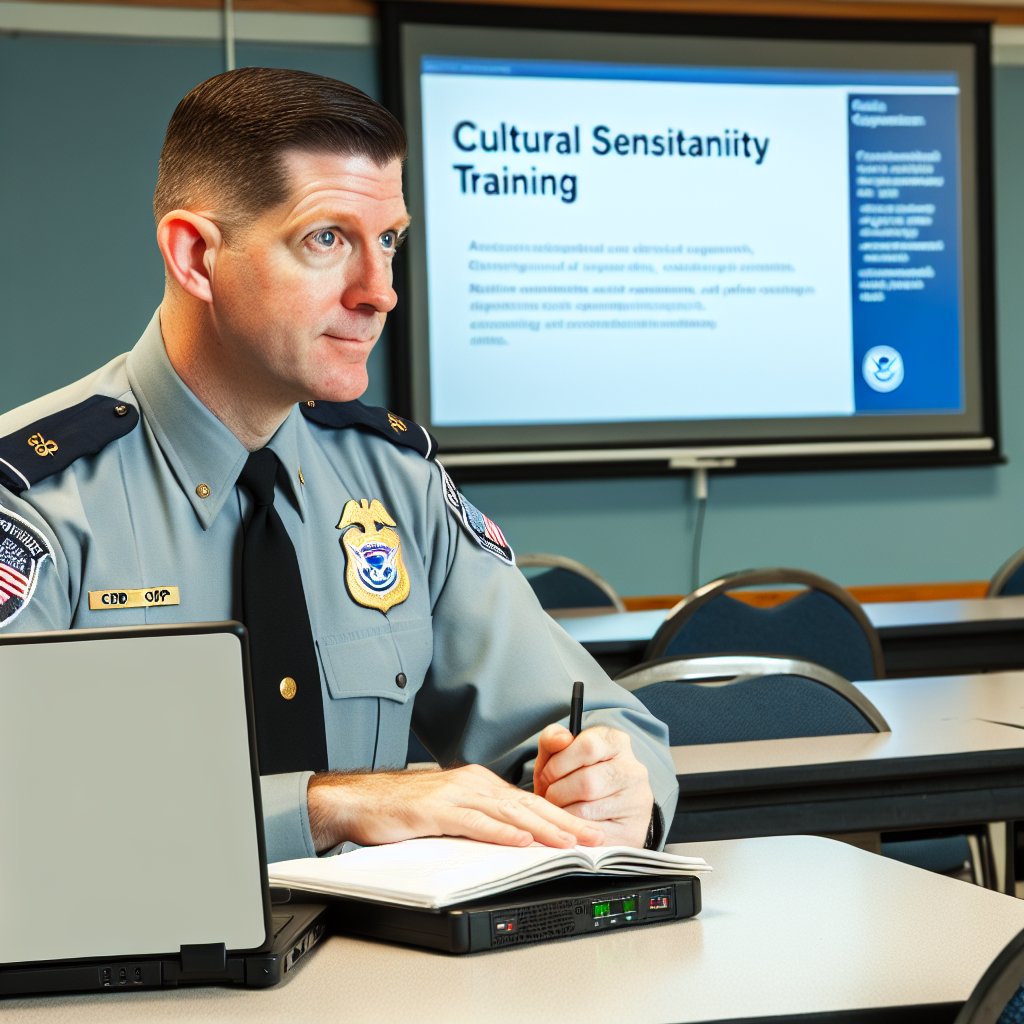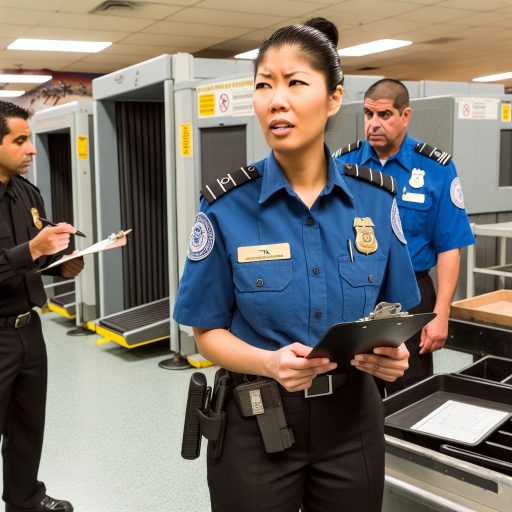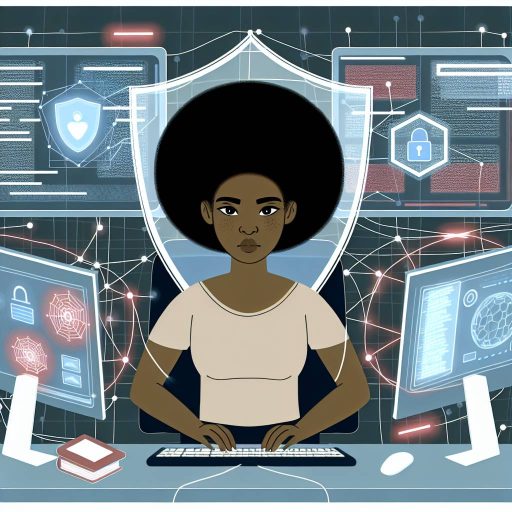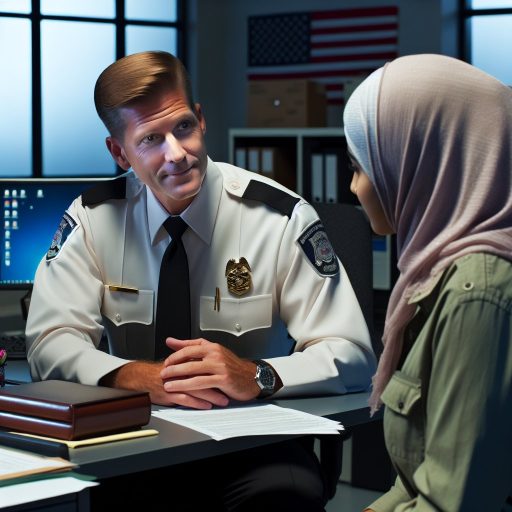Introduction
CBP officers play a vital role in maintaining border security.
They are responsible for inspecting travelers and goods entering the country to ensure compliance with laws and regulations.
Cultural sensitivity is crucial in their work to effectively interact with individuals from diverse backgrounds.
Overview of CBP Officers’ Responsibilities
CBP Officers play a crucial role in maintaining the safety and security of our nation.
- Inspection of individuals and goods at ports of entry
- Enforcement of immigration and customs laws
- Role in national security
CBP Officers are responsible for inspecting individuals and goods at ports of entry to ensure compliance with laws and regulations.
They play a critical role in preventing the entry of illegal substances, contraband, and unauthorized individuals into the country.
Inspection of Individuals and Goods at Ports of Entry
CBP Officers are tasked with inspecting individuals and their belongings as they enter the United States.
This includes checking passports, visas, and other travel documents to verify the identities of travelers and ensure they are eligible to enter the country.
Officers also inspect goods and cargo to prevent the entry of prohibited items and to enforce trade laws.
Additionally, CBP Officers conduct thorough inspections of vehicles, containers, and other modes of transportation to detect any illegal substances, weapons, or contraband that may pose a threat to national security.
Enforcement of Immigration and Customs Laws
CBP Officers enforce immigration and customs laws to regulate the flow of people and goods across borders.
They have the authority to question individuals about their travel plans, purpose of visit, and intent to stay in the country.
Officers also have the discretion to deny entry to those who do not meet the requirements or pose a risk to national security.
Furthermore, CBP Officers work closely with other law enforcement agencies to investigate and combat smuggling, human trafficking, and other criminal activities that may be linked to immigration and customs violations.
They play a crucial role in upholding the integrity of our immigration system and protecting the nation from external threats.
Role in National Security
CBP Officers are an integral part of our national security efforts.
They play a vital role in preventing terrorists, smugglers, and other threats from entering the country through our ports of entry.
Officers undergo extensive training to identify suspicious behavior, detect fraudulent documents, and respond to potential security threats.
By screening individuals and goods entering the country, CBP Officers help safeguard our borders and prevent illegal activities that may jeopardize the safety and well-being of our nation.
Their vigilance and dedication contribute to the overall security and protection of the United States.
Transform Your Career Today
Unlock a personalized career strategy that drives real results. Get tailored advice and a roadmap designed just for you.
Start NowLack of Cultural Sensitivity Training
CBP officers have demonstrated insensitivity in the past.
This has caused misunderstandings and conflicts.
Previous Incidents of CBP Officers Displaying Insensitivity
In some instances, CBP officers have made inappropriate comments and gestures towards travelers.
These actions have led to strained relationships with individuals from different cultural backgrounds.
Impact on Relationships with Travelers and Communities
The lack of cultural sensitivity training has resulted in distrust and discomfort among travelers.
This has also affected the relationship between CBP and the communities they serve.
Members of these communities may feel targeted or discriminated against due to these incidents.
Need for Formal Training
It is imperative for CBP officers to undergo formal cultural sensitivity training to prevent future conflicts.
Training will help officers better understand and respect diverse cultures they encounter daily.
This will not only improve interactions with travelers but also enhance trust and cooperation within communities.
By recognizing and appreciating cultural differences, CBP officers can perform their duties more effectively and respectfully.
Delve into the Subject: Emergency Management Director: Risk Assessment Techniques
Importance of Cultural Sensitivity Training
Cultural sensitivity training is essential for CBP officers as it helps them navigate interactions with individuals from various cultural backgrounds.
The following points highlight the significance of this training:
- Enhances communication with diverse groups: CBP officers encounter travelers from all over the world, and cultural sensitivity training equips them with the skills to communicate effectively with individuals who may have different cultural norms and expectations.
- Builds trust and cooperation with travelers: When CBP officers demonstrate an understanding of different cultures, it fosters trust and cooperation with travelers. This can lead to smoother interactions and improved compliance with customs and immigration procedures.
- Reduces misunderstandings and conflicts: By being culturally sensitive, CBP officers can avoid misunderstandings that may arise from differences in cultural practices or behaviors. This can help prevent conflicts and ensure that all interactions are conducted respectfully and professionally.
Find Out More: Career Path and Promotion Opportunities in Secret Service
Existing Training Programs
CBP Officers undergo rigorous cultural sensitivity training to enhance their ability to interact effectively with individuals from diverse backgrounds.
These programs are designed to foster respect, understanding, and empathy towards individuals of different cultures and nationalities.
Overview of Current Cultural Sensitivity Training Initiatives
- Role-playing scenarios
- Cultural competency workshops
- Case studies highlighting cultural differences
- Intercultural communication exercises
These training initiatives aim to equip CBP Officers with the knowledge and skills necessary to navigate the complexities of cultural diversity in their daily interactions with travelers and immigrants.
Feedback from Officers Who Have Undergone Training
Many CBP Officers who have participated in cultural sensitivity training have reported positive experiences and a greater sense of confidence in dealing with individuals from different cultural backgrounds.
They have expressed appreciation for the valuable insights gained from the training sessions.
Transform Your Career Today
Unlock a personalized career strategy that drives real results. Get tailored advice and a roadmap designed just for you.
Start NowOne officer noted, “The training helped me understand the importance of cultural nuances and how they can impact communication and interactions. It has made me more aware and respectful of cultural differences.”
Success Stories of Improved Interactions
There have been numerous success stories where CBP Officers were able to defuse tense situations and build rapport with travelers through their enhanced cultural sensitivity skills.
These instances have demonstrated the tangible benefits of investing in cultural awareness training for law enforcement personnel.
- A CBP Officer was able to calm an agitated passenger by using his knowledge of cultural customs to address the individual’s concerns effectively.
- Another officer successfully resolved a misunderstanding with a foreign visitor by demonstrating empathy and cultural sensitivity in their communication.
- Positive feedback from travelers has indicated a noticeable improvement in the quality of interactions with CBP Officers since the implementation of cultural sensitivity training.
Cultural sensitivity training plays a crucial role in enhancing the professionalism and effectiveness of CBP Officers in their interactions with a diverse range of individuals.
By promoting cultural awareness and understanding, these training programs contribute to creating a more inclusive and respectful environment within the Customs and Border Protection agency.
Delve into the Subject: Cyber Threats Security Consultants Must Know

– Proposed Enhancements to Training
- Incorporation of real-life scenarios and case studies
- Interactive workshops and role-playing exercises
- Ongoing refresher courses and evaluations
Cultural sensitivity training is an essential component of the training for CBP officers.
As the first line of defense at the border, CBP officers come into contact with individuals from diverse backgrounds on a daily basis.
In order to effectively carry out their duties, it is imperative that CBP officers are well-versed in cultural differences and are able to interact with individuals of various ethnicities and backgrounds in a respectful and sensitive manner.
Incorporation of Real-Life Scenarios and Case Studies
One way to enhance cultural sensitivity training for CBP officers is to incorporate real-life scenarios and case studies into their training curriculum.
By exposing officers to actual situations they may encounter in the field, they can develop a better understanding of how to navigate cultural differences and respond appropriately in sensitive situations.
Interactive Workshops and Role-Playing Exercises
Another proposed enhancement to training is the inclusion of interactive workshops and role-playing exercises.
This type of hands-on training allows officers to practice their cultural competency skills in a safe and controlled environment.
By engaging in simulated scenarios, CBP officers can hone their communication and interpersonal skills, ultimately improving their ability to interact with individuals from diverse backgrounds.
Ongoing Refresher Courses and Evaluations
In addition to initial cultural sensitivity training, it is crucial to provide CBP officers with ongoing refresher courses and evaluations to ensure that they are maintaining and improving their cultural competency skills over time.
By periodically assessing officers’ knowledge and abilities, CBP can identify areas for improvement and provide targeted training to address any deficiencies.
By incorporating real-life scenarios, interactive workshops, and ongoing refresher courses into the cultural sensitivity training for CBP officers, the agency can better equip its officers to effectively engage with individuals from diverse backgrounds in a respectful and sensitive manner.
This enhanced training will not only benefit CBP officers in carrying out their duties but also contribute to improved relations with the individuals they encounter at the border.
Learn More: Correctional Officer Salary and Benefits
Benefits of Cultural Sensitivity Training
When it comes to the role of CBP officers and the importance of cultural sensitivity training, there are several key benefits that come with implementing such a program.
Transform Your Career Today
Unlock a personalized career strategy that drives real results. Get tailored advice and a roadmap designed just for you.
Start NowLet’s delve into the advantages below:
Improved job satisfaction for officers
- Officers who have undergone cultural sensitivity training tend to feel more fulfilled in their roles.
- They are better equipped to interact with individuals from diverse backgrounds.
- This leads to a greater sense of accomplishment and job satisfaction.
- CBP officers feel more confident in their ability to handle different cultural situations.
Increased efficiency in processing travelers
- CBP officers who have received cultural sensitivity training are more adept at communicating effectively.
- They can navigate potential language barriers with ease, leading to quicker processing times.
- Understanding cultural norms and practices allows for smoother interactions during screening procedures.
- Efficiency in processing travelers ultimately benefits both the officers and the individuals they are assisting.
Enhanced reputation for CBP in the public eye
- By promoting cultural sensitivity, CBP demonstrates a commitment to valuing diversity and inclusivity.
- Positive interactions with travelers from various cultural backgrounds reflect favorably on the agency.
- Building a reputation for being culturally aware can help improve public perception of CBP.
- It fosters trust and understanding between the agency and the communities it serves.
Cultural sensitivity training plays a crucial role in shaping the effectiveness and reputation of CBP officers.
By embracing diversity and equipping officers with the necessary skills to navigate cultural differences, CBP can create a more inclusive and welcoming environment for both its employees and the individuals they interact with on a daily basis.
Cultural sensitivity is crucial for CBP officers to effectively and respectfully interact with individuals from diverse backgrounds.
A call for continuous improvement in training programs is necessary to ensure that officers are well-equipped to handle various cultural scenarios.
Emphasizing the importance of creating a welcoming and inclusive environment at ports of entry is essential to promote positive interactions.
Additional Resources
Border Patrol Agent | CBP Careers
The Essentials: Competencies for Professional Nursing Education
[E-Books for Sale]
The Big Book of 500 High-Paying Jobs in America: Unlock Your Earning Potential
$19.99 • 500 High-Paying Jobs • 330 pages
Explore 500 high-paying jobs in America and learn how to boost your career, earn more, and achieve success!
See All 500 High-Paying Jobs of this E-Book
1001 Professions Without a Degree: High-Paying American Jobs You Can Start Now
$19.99 • 1001 Professions Without a Degree • 174 pages
Discover 1001 high-paying jobs without a degree! Unlock career tips, skills, and success strategies for just $19.99!




